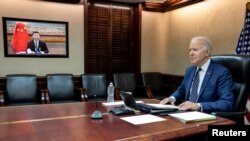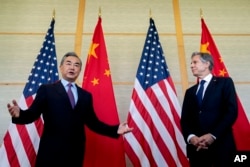The United States and China are planning a virtual meeting between their leaders as soon as the last week of July, after chief diplomats from the world’s two leading economies met last week on the margins of Group of 20 (G-20) in Bali, Indonesia.
Chinese officials have proposed July 25 for a virtual meeting between U.S. President Joe Biden and Chinese President Xi Jinping, according to diplomatic sources familiar with the five hours of talks on Saturday between teams led by U.S. Secretary of State Antony Blinken and Chinese Foreign Minister Wang Yi.
A previously planned 20-minute one-on-one session between Blinken and Wang did not take place after the lengthy discussions between U.S.-China officials that covered topics including Russia’s war on Ukraine, Taiwan, human rights, and North Korea.
“With regard to President Xi and President Biden, our expectation is that they will have an opportunity to speak in the weeks ahead,” Blinken told VOA during a press conference on Sunday in Bangkok, Thailand.
When asked if Biden and Xi could hold their first face-to-face meetings in November, Blinken said he can’t speak to “what may happen in the fall.”
Thailand is hosting this year’s Asia-Pacific Economic Cooperation (APEC) leaders’ summit November 18-19. Indonesia is hosting the G-20 summit November 15-16.
China recently told the Thai government that Xi would attend the APEC summit if he has no other obligations. Xi has not left China since the COVID-19 pandemic.
In-depth exchanges on Taiwan
A senior State Department official said the simultaneous translation during Saturday’s meetings allowed both sides to have longer discussions.
“There was pretty in-depth exchange, more specifically, on areas that we disagree, including human rights and concerns over the stability across the Taiwan Strait,” said the official.
China has increased the number of military flights into Taiwan’s air defense identification zone at sea and at times, holding military drills around Taiwan, especially during U.S. Congressional members’ visit to the self-ruled democracy.
The discussions over Taiwan came as the Chinese People's Liberation Army (PLA) conducted combat exercises around Taiwan, which drew criticism from Florida Republican Senator Rick Scott who visited Taiwan last week.
“I strongly condemn Communist China’s military aggression toward Taiwan. These shameful intimidation tactics will never weaken my unwavering commitment to supporting freedom & democracy for ALL & protecting the national security interests of the United States,” said Scott in a tweet.
Washington cautioned Beijing not to overreact ahead of a planned visit of Speaker of the U.S. House of Representatives, Nancy Pelosi to the self-ruled democracy. Pelosi, a democrat from California, postponed her trip to Taiwan in April after she tested positive for COVID-19.
U.S. officials have warned Beijing that its continuing military coercion targeting Taiwan is counter-productive, deeply destabilizing, and risks miscalculation.
For decades, the U.S. has been clear that its decision to establish diplomatic relations with China in 1979 rested upon the expectation that “the future of Taiwan will be determined by peaceful means,” as stipulated in the Taiwan Relations Act.
The United States said it “does not subscribe to the PRC’s “one China principle.”
The U.S. remains committed to its “longstanding, bipartisan one China policy, which is guided by the Taiwan Relations Act, three Joint Communiques, and Six Assurances.”
China’s readout of the Foreign Ministers’ meeting stated the U.S. “should stop hollowing out or distorting the one-China policy, cease the “salami slicing” on the Taiwan question, and refrain from playing the “Taiwan card” to obstruct China’s peaceful reunification.”
It further quoted Wang who warned the U.S. “must not underestimate the firm resolve of the Chinese people to defend their territorial sovereignty, and must not make fundamental mistakes that would imperil peace in the Taiwan Strait.”
Candid discussions on wrongly detained Chinese Americans, Uyghurs
The two sides also reportedly discussed the PRC's human rights practices. “Secretary (Blinken) was very clear regarding a number of wrongly detained Chinese Americans, (he had candid discussions with Wang) on human rights issues, including PRC nationals that we also have profound concerns,” said a senior State Department official.
Among them is prominent jailed Uighur scholar and economist Ilham Tohti who has been serving a life sentence on separatism-related charges since 2014. The scholar and economist founded the website Uyghur Online, which aims to promote understanding between Uighurs and Han Chinese. He also has been outspoken about Beijing's treatment of the Uyghur Muslim minority in the far-western Xinjiang region.
Other cases include American pastor David Lin and U.S. citizen Kai Li. Lin was detained under unclear circumstances in 2006 and later sentenced to life in prison for charges of contract fraud. Lin’s family staunchly maintained his innocence. Lin’s sentence was later reduced and is expected to be released in 2029. Li was detained in 2016 and later sentenced to 10 years in prison for espionage, a charge that his family rejects.
A senior U.S. official said Blinken “spoke in very human terms, setting aside the politics of it” when raising concerns over cases of Chinese Americans who were held hostage or wrongfully detained by PRC.
Families of Lin and Li spoke with Blinken last month.
The Dui Hua Foundation, a San Francisco-based humanitarian organization that advocates for the release of political and religious prisoners, told VOA it estimates up to 200 Americans are arbitrarily detained in China, and as many as 30 are subject to unlawful exit bans.
China's government rejects accusations it is forcing Uyghurs into internment camps, instead calling them education or job training centers. Beijing also rejects State Department accusations that Americans have been subject to arbitrary detentions while in China. In the past, Chinese officials called the Department's claims distortions of the truth and complained about the treatment of Chinese citizens in America.






